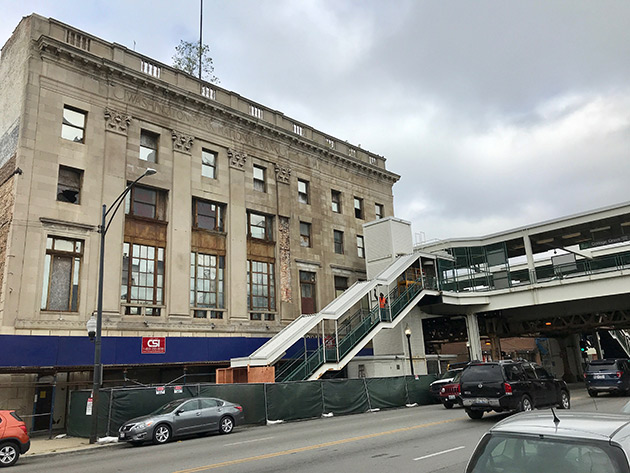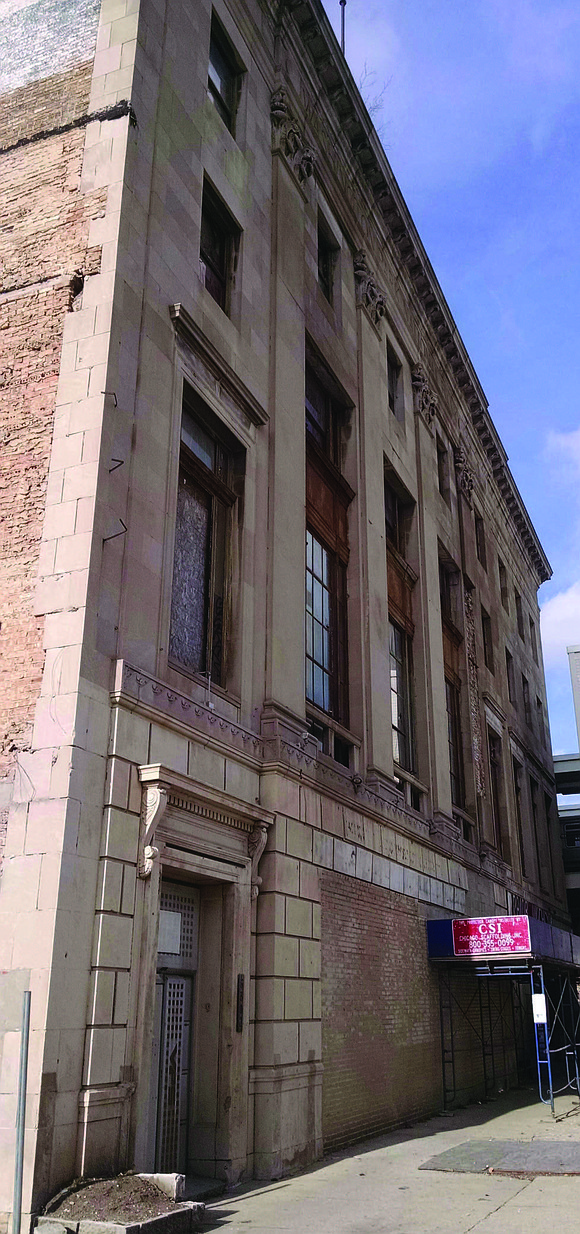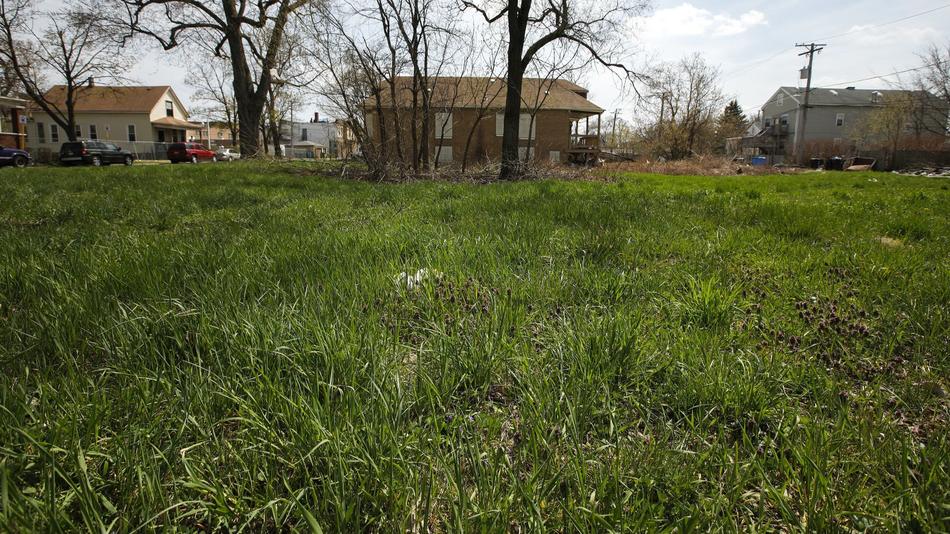EDITORIAL: Time to Let Woodlawn’s old Washington Park Bank building go
By Chicago Sun-Times Editorial Board | April 4th, 2019 (Click here for the original article)
The Cook County Land Bank is selling the Washington Park National Bank Building in Woodlawn, 6300 S. Cottage Grove Ave., after conducting public listening meetings to see what the community wants from the space.
Whenever possible, older buildings that showcase Chicago’s architectural legacy should be spared from the wrecking ball.
Every Prairie Style home and post-modern office building, every brick bungalow and greystone two-flat has value as part of the visual past and present of Chicago.
 Though preserving a building that has seen better days can cost millions, it’s often worth it. Also being preserved is our city’s history.
Though preserving a building that has seen better days can cost millions, it’s often worth it. Also being preserved is our city’s history.
In the case of the former Washington Park National Bank in Woodlawn on the South Side, however, the millions needed to save the building just aren’t there — and have not been for at least a quarter century.
That might explain why a maturing tree is growing out of the roof.
We think it’s time to allow a local developer, DL3 Realty, to put up something new. DL3 wants to raze the crumbling property, now vacant for 25 years, and put up a brand-new building that will include retail and office space, perhaps even another bank.
We say go for it.
It’s understandable that preservation groups and many residents are nostalgic about the bank building and want to save it. It’s a reminder of the community’s glory days, when 63rd and Cottage Grove was a bustling corner of commerce in a thriving middle-class community, not a place where drug dealing openly takes place.
There is not enough historic significance to this building to justify waiting any longer to find the $10 million to $15 million — at minimum — necessary to make it habitable.
The building is mildly architecturally interesting, but not on any federal, state or local historic registry. And the former longtime owner left a serious mess: a crumbling facade, a basement that floods for reasons that are unclear, that tree growing through the roof and $3.7 million in unpaid property taxes. A skylight over the main lobby has collapsed, letting in rain.
It’s no wonder that the Cook County Land Bank Authority, which bought the property last year, went with DL3 Realty’s proposal. A group that wanted to rehab the building could raise only $6 million.
Newly elected 20th Ward Ald. Jeanette Taylor has said she won’t allow the demolition. For the betterment of her community, she should think again.
As one resident of the neighborhood told the Sun-Times: “At the end of the day, change is good, especially if it’s for the better.”
WGN INVESTIGATES: Abandoned ‘Zombie Houses’ kill property values, but neighbors are fighting
By Joe Donlon & WGN Investigates | December 3rd, 2018 (Click here for the original article)
CHICAGO — Owning a home is considered part of the American dream, but for tens of thousands of people in the Chicago area it has become a nightmare.
It’s not their home that’s the problem; it’s neighbors’ abandoned houses that sit vacant and decaying for years, lowering the surrounding property values in the process. Called “Zombie Houses,” they are often left empty while they’re stuck in a legal limbo.
 WGN Investigates what’s being done to bring these properties back from the dead.
WGN Investigates what’s being done to bring these properties back from the dead.
In addition to falling into disrepair, such homes can provide easy access for squatters, drug dealers and other criminals. It’s become a real issue in areas of the Roseland neighborhood, where Pastor Glines House of New Life Baptist Church says residents have had enough.
“At night, they hear all kinds of noise and fighting, cursing, and dialects coming left and right so they’re having a problem with that,” Pastor House said.
Driving through the 16th ward, Alderman Toni Foulkes said the problem of abandoned housing is personal.
“When you’re a little girl people tell you, ‘get out of the ghetto,’ and I made it out, went to college,” Ald. Foulkes said. “But, I was homesick, and I came home.”
While Zombie Houses are an issue in parts of Englewood and other areas of her ward, Foulkes said transformation is underway. Businesses, private companies and house flippers are taking advantage of the low prices and rebuilding, street by street.
One organization taking part in this transformation is the Inner-city Muslim Action Network (IMAN), which teaches carpentry and other trades to former convicts, who then use their skills to fix up the vacant homes they acquire.
“So, when you talk about stabilizing blocks like these, it’s important to both do that with those who’ve come directly from the community, but also be able to demonstrate to neighbors who came to us and said, ‘we got to do something about these properties,'” senior organizer Shamar Hempill said.
Others like the Cook County Land Bank are trying to address vacant housing in 13 communities by removing barriers like outstanding taxes and bills, making the property more desirable for developers. The land bank is working one house at a time, according to Executive Director Robert Rose, stabilizing blocks by getting families to move into rehabilitated homes.
“Once they are rehabilitated and the family moves in… That whole block is healthy. That whole neighborhood becomes healthier,” Rose said.
Yet for all the optimism, the reality remains vacant and “Zombie” homes remain an enormous problem.
Cook County Land Bank selling Woodlawn bank building
By Aaron Gettinger, Hyde Park Herald | September 26th, 2018 (Click here for the original article)
The Cook County Land Bank is selling the Washington Park National Bank Building in Woodlawn, 6300 S. Cottage Grove Ave., after conducting public listening meetings to see what the community wants from the space.
The Land Bank, a government entity that acquires and sells financially distressed properties, usually tax delinquents at scavenger sales, is seeking requests for proposals on the 35,000-square-foot site, and will choose a buyer based on their plans for development. According to the Land Bank, the public expressed a desire for retail shops, commercial offices, and medical facilities.
The buyer will not be responsible for $3.7 million in unpaid taxes but will be accountable to the proposal they submit and subject to a redevelopment agreement with the Land Bank.
 Rob Rose, the Land Bank’s executive director, said the agency is “keenly aware” of concerns about gentrification in Woodlawn. He said the community’s “loud and clear” message was that they did not want a housing development on the site.
Rob Rose, the Land Bank’s executive director, said the agency is “keenly aware” of concerns about gentrification in Woodlawn. He said the community’s “loud and clear” message was that they did not want a housing development on the site.
“They see this building as a destination,” Rose said, adding that the community wants greater pedestrianization of the intersection as well as connections with the nearby Coleman Branch of the Chicago Public Library, 731 E. 63rd St., and the terminus of the CTA Green Line’s Woodlawn Branch, which is due for a redesign.
The development bids will be considered by a committee, on which a representative for the Woodlawn community will sit. Rose said that, while the Land Bank will consider proposals to take down the building, “our preference is for preservation.” The building was constructed in 1924 and clad in Indiana limestone.
The Land Bank is an independent agency of the county government, with suburban mayors, real estate professionals and bankers on its board chaired by North Side County Commissioner Bridget Gainer. Rose said the Land Bank’s generation of its own revenue allows for flexibility in the communities it serves and nimbleness.
The initial submission date for proposals is Oct. 1; Oct. 31 is the deadline, and the decision will be announced on Dec. 13.
Cook County Land Bank Seeks To Redevelop The Old Washington Park Bank Building
By Katherine Newman | September 26th, 2018 (Click here for the original article)
The Cook County Land Bank Authority (the Land Bank) has issued a Request For Proposal (RFP) that calls for the renovation of the 94-year-old Washington Park National Bank Building located on the corner of 63rd Street and Cottage Grove Avenue. The Land Bank has set a number of guidelines and proposals are being accepted from Oct. 1 to Oct. 31 with a decision being made by Dec. 13.
The once thriving 35,000-square-foot historical bank has been vacant for more than two decades and the Land Bank believes that once transformed, the building will become an anchor for further development of the Woodlawn neighborhood.
“Restoring the Bank Building will have an immediate impact on the area. The building will provide needed services to the area including, but not limited to, banking, community space, business incubation, café, medical offices, non-profit space, and local retail.
There is also a psychological lift for the neighborhood with having a long-term vacant building being used again,” said Rob Rose, executive director of the Cook County Land Bank Authority.
 To help guide the future redevelopment of the 63rd Street corridor the Land Bank, in collaboration with the community and the Metropolitan Planning Council, has established 10 primary objectives and parameters for the project. A few of the established parameters include creating a mixed-use design for the building, including a signature marquee to serve as a the gateway to Woodlawn, establish a pedestrian-friendly environment, and requiring the inclusion of Woodlawn residents as suppliers, professional service providers, and construction trades, according to a press release from the Land Bank.
To help guide the future redevelopment of the 63rd Street corridor the Land Bank, in collaboration with the community and the Metropolitan Planning Council, has established 10 primary objectives and parameters for the project. A few of the established parameters include creating a mixed-use design for the building, including a signature marquee to serve as a the gateway to Woodlawn, establish a pedestrian-friendly environment, and requiring the inclusion of Woodlawn residents as suppliers, professional service providers, and construction trades, according to a press release from the Land Bank.
Since 2013, the Land Bank has been working to empower local developers, community groups, and potential homeowners by giving them tools to transform their own communities from within. The Land Bank acquires properties that have sat tax-delinquent and vacant for years in order to sell them at below-market rates to qualified community-based developers, who then rehab the homes.
“The Land Bank’s mission is to acquire abandoned, vacant and blighted properties and get them back to productive use. The Bank Building is the most visible blighted building in Woodlawn so it was identified as a project. Woodlawn is experiencing a rebirth and restoring this building aids those efforts,” said Rose.
The Land Bank worked hard to make sure that the Woodlawn community was involved in creating the RFP for the Washington Park National Bank Building and Rose said that the design must compliment and respect the neighborhood aesthetic.
“It’s not my place to say what is the best design; this is one of the reasons for the Request For Proposals, which was drafted with significant community input,” said Rose. “The design elements should address energy efficiency, high air quality, stormwater management, good lighting, and walkability.”
For more information about the RFP visit www.cookcountylandbank.org/resources/bid-documents
Q&A with Executive Director Robert Rose of the Cook County Land Bank Authority
By TJ Armour, N’Digo | August 20th, 2018 (Click here for the original article)
Since its creation in 2013, the Cook County Land Bank Authorityhas worked hard to reverse the effects of the 2008 mortgage crisis by taking tax delinquent, vacant properties in south and west side neighborhoods and getting them back to a useful purpose. They’ve removed barriers that have existed for years in turning these properties around because they have the authority to quickly acquire them, eliminate all back taxes and fees associated with them and offer them to people in the community to purchase and rehab at below market to little cost.
A few of the CCLBA’s accomplishments thus far include: Rehab 500 homes that were once that vacant and tax delinquent, bringing down area home values and producing no tax revenue for local government services. These affordably priced homes are now in the hands of new homeowners or are in the process of being purchased. Generate nearly $33 million in new community wealth – i.e., home value for new homeowners. Be 100% self-funded with no taxpayer dollars used; generated $23 million in revenue through property sales and grants, which is being re-invested in acquiring new properties and to cover all operational expenses.
N’DIGO recently sat down with Executive Director Rob Rose to learn more about the organization and what else it has in store.
Q: Tell us a bit about your education and professional background?
I received my undergraduate degree in business from St. Edward’s University in Austin, TX. I received my MBA from The Johnson Graduate School of Management at Cornell University in Ithaca, NY. Pre-business school, I worked in the semiconductor and technology industry. Post-business school, my experience lies in real estate, banking, and community development.
Q: For those unfamiliar, what is the Cook County Land Bank Authority?
The Cook County Land Bank Authority (CCLBA) is a unit of Cook County government, funded primarily with revenues from property transactions. CCLBA is the largest land bank by geography in the country and is governed by a Board of Directors chaired by Cook County Commissioner Bridget Gainer. The Board of Directors is appointed by Cook County President Toni Preckwinkle and the Cook County Board of Commissioners.
Q: Please give a few examples of some of the projects to help transform communities that the CCLBA has been a part of?
One that immediately comes to mind is the Washington Park Bank Building located at 63rd and Cottage Grove. This building has been vacant for over 25 years. After acquiring the building, we engaged the Woodlawn community to determine future uses and incorporated those ideas into the Request for Proposal solicitation. We are currently working to identify a developer to rehab the Bank Building.
Q: In your opinion, what are some additional things our communities can do to keep the momentum going once people purchase the rehabbed properties?
Form or join the block club.
-
Get to know your neighbors.
-
Shop at local businesses.
-
Hold your elected officials accountable.







